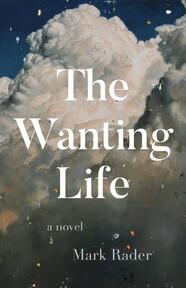Imagine the sun setting in a not-so bustling Rome—a glass of Limóncello and fresh risotto in front of you. Your table is small with intricate iron wrought detail, and the world is quiet. There’s a slight summer breeze and a whispering guitar, maybe two, in the background. You can almost hear each wish as it meets the surface of the Trevi Fountain. Mark Rader transports us, sans jetlag, to a past world of desire and love lost in his unconventional romance novel The Wanting Life. We travel from Cape Code to Italy to a generationally familiar town in Wisconsin, navigating the hearts and minds of Rader’s characters and the threads that pull so heavily on their spirits.  At the end of his life, Paul Novak aches to remember the love he denied for the sake of his faith—a love he found in his twenties in Rome and lost for fifty years. Luca, the man he spent half a century dreaming about, is the sole reason Paul has been able to outlive the doctors’ predictions, revisiting only his ghostly memories with each and every sunrise. Paul’s sister, Britta, struggles with her obesity and alcoholism after the loss of her husband, and her daughter, Maura, longs to leave her husband and two children to be with a man who “resurrected her as a person.” Through the eyes of Paul and his family, Rader poetically and simplistically poses the questions—what is it that any of us truly want? And ultimately, how far are we willing to go to get it? A priest who has grown exhausted of the battle between his religion and his heart, Paul decides it will be his dying mission to remind his family that there is no true life in wanting. How can what we desire be right when it could potentially destroy everything we love, or rather, ourselves? As strong as his faith is, Paul finds that two things are for certain: our true hearts are never wrong, and even knowing that, the world will still never unanimously agree. “We choose the truths that serve us best. You choose what to believe in and choose what not to believe in too. Even if you were religious, even if you were the most pious person in the world. Not everyone’s beliefs could actually be true—some people had to be wrong—but to every believer, the personal truth was enough.” In the last weeks of his life, Paul reminisces about his secret Italian love affair, urging his family to realize that their hearts, raw and vulnerable, should be the ruling foundation of their faith. Britta mustn’t allow herself to be lost in wanting what used-to-be, while Maura, Paul's niece, must forgive herself and fearlessly embrace the consequences she knows will come with the life she so desperately wants. While we spend almost two-thirds of our story with Paul, Rader skillfully interweaves three familial, third-person limited perspectives to paint painful, yet beautifully detailed scenes of what it’s like to exist in never-ending turmoil with our own decisions. He effortlessly gives life to the streets of 1970 Rome and cool beach nights on the Cape. We closely examine a dying, gay man looking back on his life with regret, a widow struggling to find purpose without the partner she wants beside her, and a young wife and mother choosing unhappiness for the sake of her family. While his novel weighs heavily on the importance of making the hard choices that are right in our hearts, it also brings forth the darkness that will inevitably unfold if we choose, instead, to live a wanting life. “The stars wouldn’t care, the world would keep on spinning,
0 Comments
Leave a Reply. |
Archives
July 2024
Categories
All
|
|
Glassworks is a publication of Rowan University's Master of Arts in Writing 260 Victoria Street • Glassboro, New Jersey 08028 [email protected] |
All Content on this Site (c) 2024 Glassworks
|



 RSS Feed
RSS Feed
